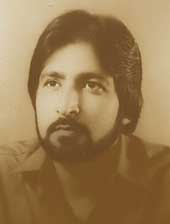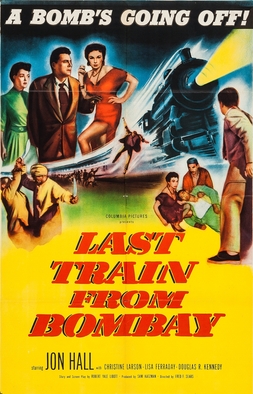A list of films produced in Pakistan in 1952 (see 1952 in film): A total of 6 films were released in the country.
A list of films produced in Pakistan in 1952 (see 1952 in film): A total of 6 films were released in the country.
| Opening | Title | Genre | Language | Director | Cast | Notes |
|---|---|---|---|---|---|---|
| 4 January 1952 | Bheegi Palken | Social film | Urdu | Sharif Nayyar | Swaran Lata, Nazir, Nazar, Allauddin, Ilyas Kashmiri, Ajmal, Shahana, Maya Devi, Ghulam Qadir, G.N. Butt, Shatir Ghaznavi, (Guest: Inayat Hussain Bhatti) | |
| 1 February 1952 | Shola | Social film | Urdu | Khadim Mohayuddin | Irshad, Masood, Asha Poslay, Sadiq Ali, Maya Devi, Abbu Shah, G.N. Butt | |
| 28 March 1952 | Dupatta | Romantic, musical film | Urdu | Sabtain Fazli | Noorjahan, Ajay Kumar, Sudhir, Azad, Ghulam Mohammad, Nafisa Begum, Bibbo, Syed Rafiq, Zohra, Iffat, Owais, (Guest: Yasmin) | This great musical film was third hat-trick of success by Madam Noor Jehan and musician Feroz Nizami (after Jugnu and Chann Way). |
| 4 April 1952 | Harjai | Social film | Urdu | Shafqat Shah | Najma, Masood, Zeenat, Asif Jah, Zahoor Shah, Sadiq Ali, Kalavati | |
| 24 October 1952 | Nath | Social film | Punjabi | Shafi Mohammad Ejaz | Hafeez Jahan, Haseeb, Talish, Zarif, Ajmal, Sadiq Ali | |
| 26 December 1952 | Naveli | Social film | Urdu | Hyeder Shah | Gulshan Ara, Rehan, Sultan Khoost, M. Ismael | This was the debut for Rehan. The first name of this film was Karwatten. |

Noor Jehan was a Pakistani playback singer and actress who worked in both British India and later in Pakistan's cinema. Her career lasted over six decades, during which she recorded 10,000 songs. Jehan had proficiency in Hindustani classical music, as well as in other genres such as Punjabi and Sindhi. She made her directorial debut with the film Chann Wey in 1951, becoming the first female film director in Pakistan. She is recognized for her contributions to music in the Indian subcontinent, particularly in Pakistan. She was given the title of Malika-e-Tarannum in Pakistan.

The National Anthem of Pakistan, also known by its incipit "The Sacred Land", is the national anthem of the Islamic Republic of Pakistan and formerly the Dominion of Pakistan. First composed by Ahmad G. Chagla in 1949, lyrics in Persified Urdu were later written by Hafeez Jalandhari in 1952. It was broadcast publicly for the first time on Radio Pakistan on 13 August 1954, sung by Jalandhari himself and officially adopted on 16 August 1954 by the Interior Ministry of the Government of Pakistan.
Mumtaz means "excellent" in the Arabic language. It may be used to signal commendation for an achievement, similar in meaning to bravo and kudos.

Runa Laila is a Bangladeshi playback singer and composer. She started her career in the Pakistani film industry in the late 1960s. Her style of singing is inspired by Pakistani playback singer Ahmed Rushdi and also frequently joined him for singing duets, after replacing another singer Mala. Her playback singing in films – The Rain (1976), Jadur Banshi (1977), Accident (1989), Ontore Ontore (1994), Devdas (2013) and Priya Tumi Shukhi Hou (2014) - earned her seven Bangladesh National Film Awards for Best Female Playback Singer. She won the Best Music Composer award for the film Ekti Cinemar Golpo (2018).
Mohammad Zahirullah, known as Zahir Raihan, was a Bangladeshi novelist, writer and filmmaker. He is most notable for his documentary Stop Genocide (1971), made during the Bangladesh Liberation War. He was posthumously awarded Ekushey Padak in 1977 and Independence Day Award in 1992 by the Government of Bangladesh.
Athar ul-Haque Malik, known professionally as Art Malik, is a British-Pakistani actor. He achieved international fame in the 1980s through his starring and supporting roles in assorted British television serials and films. He is best known for his portrayal of the out-of-place Hari Kumar in The Jewel in the Crown at the outset of his career.
Nazar Mohammad was a Pakistani cricketer who played in five Test matches in 1952. He was educated at Islamia College, Lahore.
The following pages for each decade list films produced in Pakistan by year of release.
Events from the year 1952 in Pakistan.

The film industry of Pakistan, consisting of motion pictures, has had a large effect on Pakistani society and culture since the nation's independence. Pakistani cinema is made up of various sub-industries, including Lollywood, which makes motion pictures in Urdu and Punjabi. Lollywood is one of the biggest film industries in the country.

Shahnaz Rahmatullah was a Pakistani and later Bangladeshi singer. Her notable songs are ''Prothom Bangladesh Amar Sesh Bangladesh'', Ekbar Jete De Na Amar Chotto Sonar Gaye, Je Chilo Drishtir Shimanay and Ek Tara Tui Desher Kotha. She was the recipient of the Ekushey Padak in 1992 and Bangladesh National Film Award for Best Female Playback Singer for the film Chhutir Phande (1990).
Ghulam Fariduddin Ayaz Al-Hussaini Qawwal is a Pakistani Sufi devotional singer. He belongs to the Qawwal Bacchon gharana of Delhi.
Yousuf Kamal, known professionally as Shakeel Yousuf, was a Pakistani actor best known for his roles in the PTV drama series Uncle Urfi (1975), as Mehboob Ahmed in PTV's Aangan Terha (1984), and as Taimoor Ahmad in Ankahi (1982).
Nazir Ahmed Khan was the Founding Father of Pakistan Film Industry. He was a versatile filmmaker, actor, director and producer.
Shah Zaman Khan Afridi ,better known as Sudhir or Lala Sudhir ,was a Pakistani actor, director, and producer.

Muhammad Qavi Khan was a Pakistani film, radio, theatre and television actor, director and playwright.

Ravindra Kaushik was an Indian Research and Analysis Wing agent who spied for India from 1975 until he was captured in 1983. Also known as The Black Tiger, Kaushik is considered as one of India's greatest spies. He successfully infiltrated the Pakistan Army and reached the rank of major.

From 1947 to 1956, the Dominion of Pakistan was a self-governing country within the Commonwealth of Nations that shared a monarch with the United Kingdom and the other Dominions of the Commonwealth. The monarch's constitutional roles in Pakistan were mostly delegated to a vice-regal representative, the governor-general of Pakistan.

Last Train from Bombay is a 1952 American thriller film directed by Fred F. Sears and starring Jon Hall, Christine Larson and Lisa Ferraday. It was produced by Sam Katzman for distribution by Columbia Pictures and partly shot at the Iverson Movie Ranch. The film's sets were designed by the art director Paul Palmentola.
Tufail Hoshiarpuri was a film song lyricist and a poet from Pakistan.